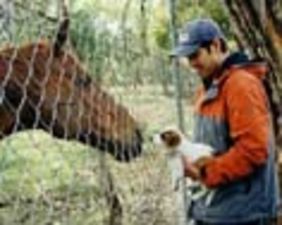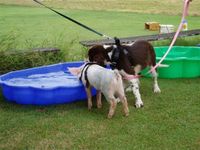This article by Oliver Beverly of C.L.E.A.R. Dog Training, Brisbane, was published in the August-September 2006 Newsletter of the Association of Pet Dog Trainers Australia. In 2012 CLEAR replaced group puppy school classes - to which peopple including breeders, vets and other dog trainers had been coming from all over S.E.Qld for ten years - with in-home individual puppy education.


There is a bewildering amount of conflicting advice given by various breeders, pet stores, trainers and vets as to the ideal age to take a puppy to puppy school. Unfortunately the result is often that confused owners postpone making a decision and their in next to no time adolescent dogs end up missing out and not being taken to puppy school at all.
A medical argument from some breeders and vets is that if we take a puppy too early to puppy school s/he could get a fatal disease, such as distemper or parvo virus. Therefore it is best to keep our puppies in cotton wool, quarantined and isolated and, various people advise, not even allowed on the ground outside till two weeks after their last vaccination.
The counter argument is from other breeders, pet stores, vets and trainers who take into consideration both the medical and behavioural risks involved. They look at the bigger picture, weigh up the pros and cons and conclude that the latter risks far outweigh the former. By the time a puppy is 16-18 weeks old s/he is almost a teenager and many undesired habits may have formed and it is much too late for puppy school!
Dr Lyn Upton, from Upton and Upton Veterinary Surgeons in the Brisbane Bayside suburb of Capalaba points out there is no absolute guarantee anyway that a puppy kept in the house and/or backyard for the first four and a half months of life could not get parvo virus from the shoes of a stranger or even a family member entering the house and garden.
Due to the generally widespread use of vaccines, in most areas around Australia there are far fewer instances of diseasesthan in the past. At Dr Uptons state of the art and very busy modern surgery puppies attend puppy school from eight weeks onwards. Dr Upton has not seen a case of distemper for many years, so the medical reason to keep a puppy isolated is less valid than it may have been in years gone by.
Dr Debbie Calnon from Melbourne, a Delta accredited Canine Good Citizen Instructor, a member of the Association of Pet Dog Trainers Australia and a Veterinary Behaviourist (a vet with additional university qualifications in animal behaviour), says, "I strongly agree with Dr Upton that the closer the puppies can be to 8 weeks of age for puppy school the better. The only exception may be in a local area that has perhaps had an outbreak of parvovirus, etc. Even then, with proper client education I'd still be recommending 8 weeks."
It is almost 100% guaranteed that a four and a half month old puppy that has not been appropriately socialised to people, other puppies, things (e.g. skateboards, bicycles, horses, fire engines, etc), as well as a variety of surfaces and different places is likely to grow up developmentally retarded. More importantly the puppy is likely to have poor bite inhibition to people. Other less serious but equally unnecessary behavioural problems also often develop and thousands of adorable fluffy eight week old puppies never make it to their first birthday.



Ursula, the piglet, at C.L.E.A.R Dog Trainings Sunday morning puppy classes
Dr Ian Dunbar, one of the world's leading Veterinary Behaviourists and founder of the Association of Pet Dog Trainers, once said that it takes only two days from arriving in his/her new home for apuppy's death warrant to be signed. Many owners have not become sufficiently educated and, through no fault of their own, are doing many things wrongly that lead to inevitable behavioural problems.
For the very reason of knowinghow to do things correctly - and what common mistakes to avoid, especially re house training it is crucial that owners, especially first time ones, attend a GGOD puppy school sooner rather than later. There they will obtain correct advice, recommended reading and good puppy class handouts such as those contained in the invaluable puppy school CD recently produced by Dr Calnon.
Research in the USA has shown that the risk of dieing from a fatal disease is 500 times less than having to be re-homed or euthanized because of a socially unacceptable behavioural problem such as house soiling, jumping up, biting, aggression, destroying furniture, being overly excited or generally an out of control adolescent lunatic.
There are an estimated 55 million dogs in the USA. Dr Karen Overall, Head of the Veterinarian Medical School at the University of Pennsylvania, says, 12 million dogs are euthanized every year, 95% of them for behavioural problems. In other words, 1,319 dogs an hour die because many of their owners have been either ignorant or too busy or have not cared enough to give them a head start in life by way of adequate education.
In Queensland, where statistically many more puppies die each year from eating snail bait or getting tick paralysis or cane toad poisoning than from a fatal disease, there is an additional reason not to postpone attending a WELL RUN puppy school. Owners have often not been made aware by their breeder, pet store or vet if they have yet been to one of the risks and that they need to take several necessary precautions from day one.
Nowadays all around Australia there are many forward thinking training schools, dog clubs, vet surgeries, pet stores and organisations like the RSPCA who understand the bigger picture. They actively encourage owners to take their eight week old puppies, provided they have had their first injection, to their puppy schools where, naturally, all reasonable hygiene precautions should be taken.
Oliver Beverly
C.L.E.A.R. Dog Training 2006